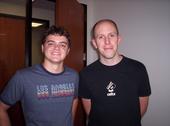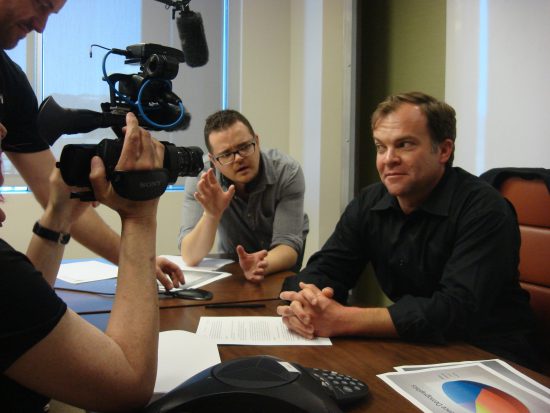John welcomes Grant Faulkner, Executive Director of NaNoWriMo and author of Pep Talks for Writers, to discuss the writing process and how to get out of your own way creatively.
We explore the ubiquity of the Other Syndrome and the perils of envy. We also look at pen names, “throw-away writing,” and the advantages of being a beginner.
Links:
* Grant Faulkner’s [website](http://www.grantfaulkner.com) and [Wikipedia entry](https://en.wikipedia.org/wiki/Grant_Faulkner).
* Pep Talks for Writers by Grant Faulkner is available [here](http://www.amazon.com/dp/1452161089/?tag=johnaugustcom-20).
* You can participate in [NaNoWriMo](https://nanowrimo.org/), too!
* [I’m Your Man: The Life of Leonard Cohen](http://www.amazon.com/dp/0061994987/?tag=johnaugustcom-20) by Sylvie Simmons
* [The Last Invention of Man: How AI might take over the world](http://nautil.us/issue/53/monsters/the-last-invention-of-man#comm) by Max Tegmark
* [The Scriptnotes Listeners’ Guide!](johnaugust.com/guide)
* [The USB drives!](https://store.johnaugust.com/collections/frontpage/products/scriptnotes-300-episode-usb-flash-drive)
* [John August](https://twitter.com/johnaugust) on Twitter
* [Grant Faulkner](https://twitter.com/grantfaulkner) on Twitter
* [John on Instagram](https://www.instagram.com/johnaugust/?hl=en)
* [Find past episodes](http://scriptnotes.net/)
* [Outro](http://johnaugust.com/2013/scriptnotes-the-outros) by Rajesh Naroth ([send us yours!](http://johnaugust.com/2014/outros-needed))
Email us at ask@johnaugust.com
You can download the episode [here](http://traffic.libsyn.com/scriptnotes/scriptnotes_ep_321.mp3).
**UPDATE 10-23-17:** The transcript of this episode can be found [here](http://johnaugust.com/2017/scriptnotes-ep-321-getting-stuff-written-transcript).
 I first met Adam Davis in 2006, back when he was finishing up at Drake University, my alma mater. He loved movies, and was wondering whether he should bite the bullet and move to Los Angeles. I said yes, definitely — but he should prepare to work his ass off when he got here.
I first met Adam Davis in 2006, back when he was finishing up at Drake University, my alma mater. He loved movies, and was wondering whether he should bite the bullet and move to Los Angeles. I said yes, definitely — but he should prepare to work his ass off when he got here. As I kept up with the momentum and ran headfirst into production, I was able to lock down the perfect cast, the right crew and an amazing location. I didn’t, couldn’t, stop and things somehow kept falling into place. The cast and I rehearsed the script like a play for 2 weeks because we had to shoot quickly, only allowing them a few takes per scene. And the script was ninety-five percent dialogue, being a group of people stuck in a room together. But the cast was up to it and they performed better than I could have ever imagined. At the end of June, after 4 grueling days spread out over 2 weekends, we had everything in the can. Apologies in advance for getting way too honest here, but on the last day of shooting I came home and all I could do was sit in my car and cry for a solid 5 minutes. They were happy tears, grateful tears, because somehow I had done it. I had finally accomplished my biggest goal.
As I kept up with the momentum and ran headfirst into production, I was able to lock down the perfect cast, the right crew and an amazing location. I didn’t, couldn’t, stop and things somehow kept falling into place. The cast and I rehearsed the script like a play for 2 weeks because we had to shoot quickly, only allowing them a few takes per scene. And the script was ninety-five percent dialogue, being a group of people stuck in a room together. But the cast was up to it and they performed better than I could have ever imagined. At the end of June, after 4 grueling days spread out over 2 weekends, we had everything in the can. Apologies in advance for getting way too honest here, but on the last day of shooting I came home and all I could do was sit in my car and cry for a solid 5 minutes. They were happy tears, grateful tears, because somehow I had done it. I had finally accomplished my biggest goal.